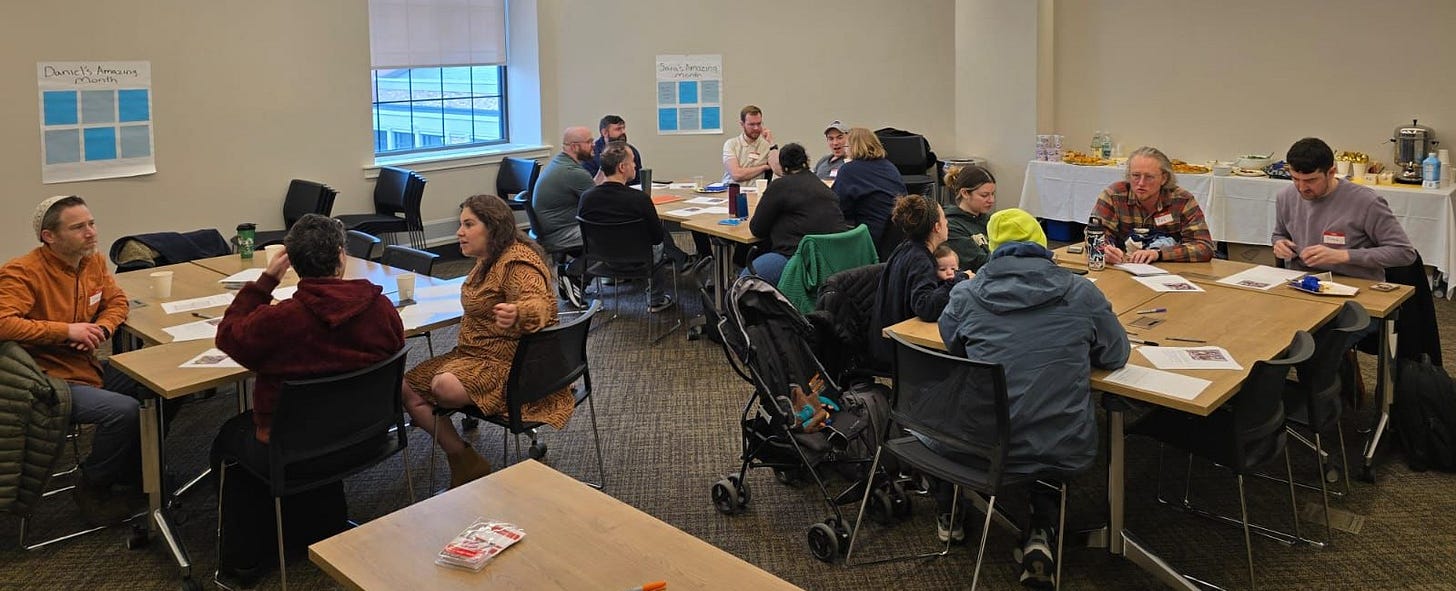My name is Dr. Louise Williams, and I have the privilege of serving as the facilitator for Voices of the Future. I’m a young adult myself, and like many in my generation, I’ve often found myself navigating the space between loving my community and not quite knowing where I fit within its leadership structures. Through my work across various nonprofit spaces, I’ve developed a passion for building communities where people, especially young adults, feel heard, valued, and empowered to help shape what comes next. Voices of the Future is designed to be that kind of space. It invites young adults to step into meaningful conversations about the future of our local Jewish community.
You may already be familiar with NEXTGen, the Federation’s vibrant program for Jewish young adults. Its focus on building social connections has created a vital entry point into Jewish communal life. These joyful, welcoming spaces are more than just fun; they send a powerful message to young adults: you belong here.
With that foundation of connection and community in place, the time was right for something new to emerge: Voices of the Future. This initiative is a natural next step in the evolution of young adult engagement. While NEXTGen fosters social belonging, Voices responds to another essential need—the opportunity for young adults to take part in conversations that shape Jewish life in South Bend. The objective of the Voices program is to empower young adults to use their voices to shape, strengthen, and reimagine the future of our community.

Though still in its early days, the program has already accomplished a lot. In our first session, we explored what matters most to young adults at this moment. Through collaborative discussion and small-group work, we identified three shared priorities:
Work to unite the reform/conservative/orthodox communities here in South Bend
Advocate for events that prioritize keeping people engaged year-round in Jewish life
Encourage non-denominational Jewish Childhood Education
In our second session, we turned our focus toward imagination and possibility. What would an amazing month in Jewish South Bend look like? To explore this, we introduced three fictional characters, each with a different but distinctly Jewish identity and lifestyle. In small groups, participants envisioned the kinds of events, spaces, and connections that would make those characters feel welcomed, supported, and inspired. From these conversations emerged several ideas including: an informal sports league, a co-working space, and a Jewish community job board. This visioning exercise helped us move from abstract ideas to concrete action, illuminating the kinds of support that could truly enrich the lives of young Jewish adults in our community.
As our conversations deepened, it became clear that participants had varying levels of knowledge about current developments in South Bend’s Jewish community. To bridge that gap and ensure everyone was working from a shared understanding, we invited community leaders to join our next session. Avromi Klor provided an exciting update on the Paragon Building downtown, a project with the potential to revitalize Jewish life at the heart of the city. We were also joined by LouAnn Dobbins from Temple Beth-El and Carey Gaudern from Sinai Synagogue, along with Cristyne Porile and Moshe Kruger representing the Federation. Together, they offered background and updates on a major conversation currently underway—the potential relocation of Sinai and Temple Beth-El to the Federation campus. After hearing from leadership, participants had the opportunity to ask questions, raise concerns, and begin engaging directly in these important community discussions.
The conversation that followed was thoughtful, candid, and deeply needed. Some participants expressed frustration about not being more directly involved in recent decision-making processes that affect the broader community. Others raised significant questions about how we welcome and engage Jewish individuals who move to South Bend, including those who may not have strong synagogue ties. Overall, the evening highlighted the need for more open and transparent communication between leadership and young adults and affirmed that Voices of the Future is becoming a meaningful space where that dialogue can begin.
One of the challenges facing young adults in the nonprofit world, including in Jewish spaces, is that we are often spoken about, but rarely spoken with. Our needs are analyzed, our absence is lamented, but our perspectives are too frequently left out of the actual conversations that shape the future.
Voices of the Future was created to change that.
This program isn’t only a space for young adults to gather. It’s a space for meaningful exchange where participants speak with one another, with leadership, with institutions, and with the generations that came before them. Leadership doesn’t have to guess what young adults want or value. Voices creates a space where they can be asked directly and trusted to offer real input.
This is L’dor V’dor in action. Not just the passing down of tradition, but a conversation between generations. Through that kind of intentional relationship—rooted in listening and shared purpose—the future of Jewish life can begin to take shape.
If you are interested in being a part of this program, please contact me using the information below.
Dr. Louise Williams
Administrative Assistant
(574) 233-1164 x1820
Click here to email Dr. Louise.

